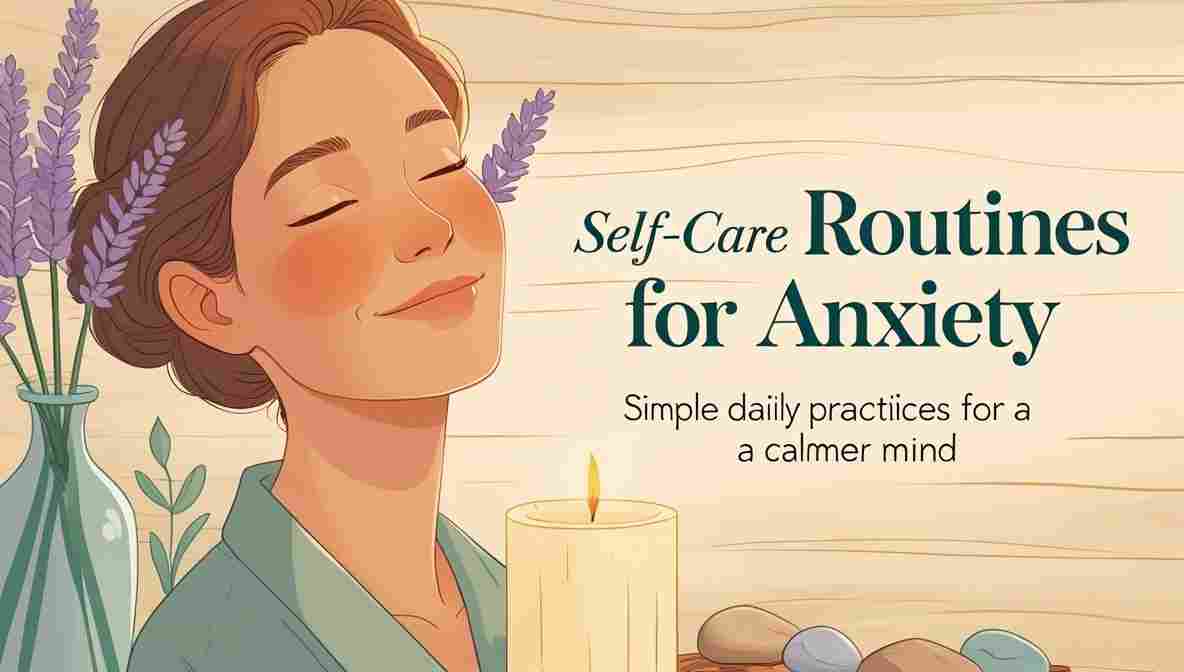Self-Care Routines for Anxiety: Simple Daily Practices for a Calmer Mind
Anxiety can feel overwhelming, but the good news is—you have more control than you think. Creating a consistent self-care routine can significantly ease symptoms of anxiety and improve your overall mental health. This guide will walk you through proven self-care routines for anxiety, backed by science and designed to fit into any lifestyle.
🧘♂️ 1. Start Your Day with Mindfulness
Morning mindfulness helps ground your thoughts before stress sets in. Try this:
- 5-minute meditation (use apps like Calm or Headspace)
- Deep breathing (inhale for 4, hold for 7, exhale for 8)
- Gratitude journaling—write 3 things you’re thankful for
Pro tip: A mindful start reduces cortisol levels and builds emotional resilience.
🏃♀️ 2. Incorporate Movement into Your Routine
Exercise is one of the best natural anxiety relievers.
- Morning stretches or yoga (10–15 minutes)
- Walks in nature (green spaces help reduce anxiety)
- Cardio 3x a week (running, cycling, or dancing)
Even light movement boosts serotonin and dopamine—your brain’s happy chemicals.
📵 3. Limit Digital Overload
Constant notifications and doom-scrolling spike anxiety. Create a tech-friendly self-care plan:
- Set screen-free hours, especially before bed
- Avoid social media comparisons
- Use apps like Forest to stay focused and mindful
🛁 4. Create a Nighttime Wind-Down Ritual
Poor sleep worsens anxiety. Improve rest with a relaxing routine:
- Herbal tea (chamomile or lemon balm)
- Warm bath with Epsom salt
- Read a calming book instead of checking your phone
Try pairing this with white noise or calming playlists to improve sleep quality.
🍲 5. Nourish Your Body, Calm Your Mind
There’s a strong gut-brain connection. Include foods that support mental health:
- Omega-3-rich foods (salmon, flaxseeds)
- Fermented foods (yogurt, kefir, kimchi)
- Avoid caffeine and processed sugar spikes
For more insight, read our post on nutrition and mental health.
✍️ 6. Express Through Journaling
Journaling helps untangle anxious thoughts. Try:
- Daily worry dump: write everything on your mind
- Mood tracking with triggers and coping responses
- Positive affirmations or self-compassion notes
This practice promotes emotional clarity and stress release.
🤝 7. Stay Connected to Supportive People
Anxiety thrives in isolation. Make social self-care a priority:
- Weekly check-ins with friends or family
- Join support groups or mental health forums
- Talk to a therapist, even virtually
Bonus: Try these apps for managing anxiety that offer 24/7 support tools.
🌿 Integrating Holistic Therapies
Alternative practices like aromatherapy, acupuncture, or herbal supplements (with professional advice) can complement your anxiety care.
✅ Final Thoughts: Small Routines, Big Results
There’s no “one-size-fits-all” when it comes to anxiety, but small daily self-care steps make a big difference over time. Whether it’s mindfulness, movement, or nutrition—consistency is the key to healing.
📌 FAQs on Self-Care Routines for Anxiety
1. What is the best self-care habit for anxiety?
Mindfulness meditation and regular exercise are among the most effective self-care habits.
2. Can diet really affect anxiety?
Yes. Gut health and brain health are linked. Eating nutrient-rich foods can reduce anxiety symptoms.
3. How often should I practice self-care?
Daily routines—even if short—are best for sustainable mental health benefits.
4. Are self-care routines a substitute for therapy?
They help, but professional therapy is crucial for moderate to severe anxiety.
5. Can digital detoxing improve anxiety?
Yes. Reducing screen time lowers overstimulation and supports emotional balance.
